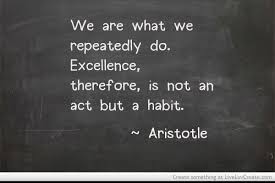
Aristotle was a Greek philosopher and scientist that was a prolific writer and polymath. With his works, he radically transformed most of the areas of knowledge he touched, revolutionizing the way the world saw subjects pertaining to philosophy. One of his most popular works involved finding the golden mean of all things, especially that of happiness.
The golden mean was first established in ancient Greek philosophy and was thought to be the desirable balance amidst the extremities pertaining to a subject. In life, there are extremities in all things, for when there is light, there will be dark. As Aristotle, would put it, courage is the golden mean and a virtue. But in excess, it would manifest itself as recklessness and in deficiency, it would only result in cowardice.

Happiness as The Exercise of Virtues
Aristotle believed that happiness was a result of not only having good moral character but carrying it out actively. To be virtuous in the eyes of Aristotle is to act in accordance with virtue actively. It is not a state of passiveness, nor is it a situation where you can pick and choose your virtues. Instead, one must either strive to possess all of them or none at all.
In life, to truly be happy means to possess all goods, be it tangible or intangible such as wealth, friends, health, knowledge and so on. Should one strive to achieve all of the above, then it requires him to make strategic choices or choices that would result in great contemplation. Often times, the struggle would come in the form of instant gratification as opposed to one that requires a sacrifice of sorts. The former would result in a short-lived happiness that is of lesser value and would eventually lead to long term pain.
To truly acquire a happy life means a life long journey to exercising our virtues and actively searching for life-long education. Happiness is about going out to acquire that complete set of virtues along with challenging your mind with the questioning of all things in nature.
Establishing the Golden Mean of Virtue
All things being said; the golden mean of virtue merely ask that we not limit ourselves to exercising our virtues. After all, the mean is that of deficiency and excess and is a mean between two vices. Everyone has their relative mean, which is to say that an excess of giving in one could very well be the mean of another. We should all take these measurements with a pinch of salt and exercise flexibility when it comes down to finding our happiness.
With that, it concludes the meaning of happiness to Aristotle. That happiness is the sole purpose of one’s existence and can only be achieved at the end of one’s life. It is not a state, but rather a goal as we journey through life, exercising our virtues and striking a balance with the golden mean. Finally, intellectual contemplation is important at every point of our life as rationalizing is integral to living a life as a human.